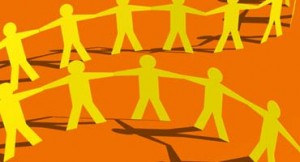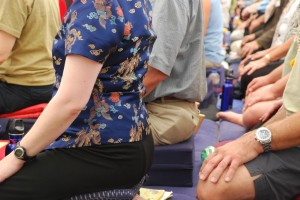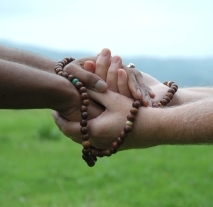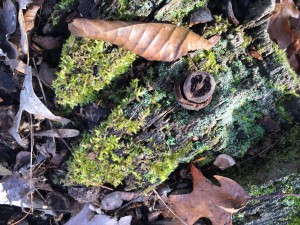Thursday
Featured StoriesThe Nature of Community
An exploration of our deep connections to one another, and to our own compassionate hearts
by Aaron de Long
 We might think of community as something external to our life, something extra. We have our car, our home, our job, and then we have our neighbors, our coworkers: our community. But community is not just the people who live next door or who work in the same office, it is also the people who pave our roads, who work at the power plant, who grow the lettuce we eat and truck it to the store. Community is every connection we have with the world around us that sustains our way of life.
We might think of community as something external to our life, something extra. We have our car, our home, our job, and then we have our neighbors, our coworkers: our community. But community is not just the people who live next door or who work in the same office, it is also the people who pave our roads, who work at the power plant, who grow the lettuce we eat and truck it to the store. Community is every connection we have with the world around us that sustains our way of life.
Editor’s Note: We are currently on hiatus from publishing new articles; in the meantime, please enjoy this classic item reprinted from our back issues.
In our society, these connections can be hard to discern. The people upon whom we rely for our standard of living are often invisible, sometimes living thousands of miles away. In many ways, this complexity of connections that gives rise to our life, the geographical extent of our ‘community’, speaks to a profoundly developed civilization. The physical separation of our being with these others, however, can also lead to a feeling of isolation, of alienation.
 The extent of our exchange with others is often reduced to a simple abstraction, a dollar, something that is increasingly not even encountered in a physical form. This feeling of isolation is a delusion–we simply could not exist without a multitude of connections–but it is a powerful one. In this place confusion takes root, and we can lose our understanding of what reality is. We can think the world is against us, or indifferent towards us, even while we ourselves are part of it. It is similar to a meditation practitioner who might see all his flaws more clearly through his practice, but fail to recognize the brilliance of mind within which these flaws are illuminated. We miss the forest for the trees; without communal support, we would be unable to ponder the perceived absence of that support.
The extent of our exchange with others is often reduced to a simple abstraction, a dollar, something that is increasingly not even encountered in a physical form. This feeling of isolation is a delusion–we simply could not exist without a multitude of connections–but it is a powerful one. In this place confusion takes root, and we can lose our understanding of what reality is. We can think the world is against us, or indifferent towards us, even while we ourselves are part of it. It is similar to a meditation practitioner who might see all his flaws more clearly through his practice, but fail to recognize the brilliance of mind within which these flaws are illuminated. We miss the forest for the trees; without communal support, we would be unable to ponder the perceived absence of that support.
Evolution
For life, community is the soul of prosperity. Living systems with low species diversity and sparse populations are in precarious positions in terms of survival, particularly if environmental conditions change. It is those systems with the greatest diversity and fecundity, the largest communities, which are the strongest and most robust. Humanity itself has only survived and prospered through the development of social networks, allowing for the sharing of resources, technologies, and the specialization of tasks. Today, more and more studies are linking individual happiness, longevity, and well-being to developed social networks, to community.
 In the Buddhist context, this could all speak to the precious nature of the third jewel, the sangha. In the context of modern society, it could also speak towards the key to a more humane, sustainable future. Recently, I listened to Vermont’s U.S. Senator Bernie Sanders speak of the descent of America into an oligarchy, a country controlled by a few billionaire families who are rigging ‘the game’ for their own benefit, at the expense of the rest of us. “Is there any hope?” he asked the listening audience. It seems to me that the hope lies in the further development of social networks, both in person and electronically. If we can communicate and work with one another, if we can build communal trust, we can begin to transcend a culture where all exchange is centralized and monetary. We can begin to create a new sort of social order echoing an older, ancestral one, one of cooperation and more direct trade.
In the Buddhist context, this could all speak to the precious nature of the third jewel, the sangha. In the context of modern society, it could also speak towards the key to a more humane, sustainable future. Recently, I listened to Vermont’s U.S. Senator Bernie Sanders speak of the descent of America into an oligarchy, a country controlled by a few billionaire families who are rigging ‘the game’ for their own benefit, at the expense of the rest of us. “Is there any hope?” he asked the listening audience. It seems to me that the hope lies in the further development of social networks, both in person and electronically. If we can communicate and work with one another, if we can build communal trust, we can begin to transcend a culture where all exchange is centralized and monetary. We can begin to create a new sort of social order echoing an older, ancestral one, one of cooperation and more direct trade.
One of the bases of physics, the law of entropy, colloquially states that things fall towards disorder. In living systems, however, we often see things tending towards symbiosis, or, in a sense, to greater order. In the end, the development of strong, diverse communities is what allows for the greatest security for all individuals. It might not allow for the greatest number of one particular species at one particular time, but it can mean a longer survival period for that species, overall. Such a species, built for the long run, will cultivate diversity, build cooperative relationships with its neighbors and, in time, may even come to be indistinguishable from them. Mitochondria, the organelles that today produce the energy to power most of our cells, were probably initially parasites. Lichen are really the fusion of an algae and a fungus, two organisms that have joined to the point where they are considered one and cannot survive independently.
Compassion
 We are all walking the road of life together. If we join hands or, perhaps more accurately, if we recognize that our hands are already joined, it is likely that we will go forth with more clarity, greater joy, and a better chance for humanity’s long-term survival. Our community is really our world, and we ourselves are little more than a series of relationships, inseparable from our neighbor on his lawnmower, from the fox in the hedge, or from the trees that stand by, stretching their limbs up into the sky.
We are all walking the road of life together. If we join hands or, perhaps more accurately, if we recognize that our hands are already joined, it is likely that we will go forth with more clarity, greater joy, and a better chance for humanity’s long-term survival. Our community is really our world, and we ourselves are little more than a series of relationships, inseparable from our neighbor on his lawnmower, from the fox in the hedge, or from the trees that stand by, stretching their limbs up into the sky.At its inception, society is the interaction between two people. In its most basic form, it is birth. We might grow up to have painful interactions, to experience trauma and difficulty, but our lives began with someone else saving us, again and again. Our lives began with compassion. In this sense, compassion is the heart of community; it is the fabric of the interconnecting thread.







Jan 19, 2016
Reply
Just beautiful and so very true. Thanks!
Jan 18, 2016
Reply
Thank you Density.